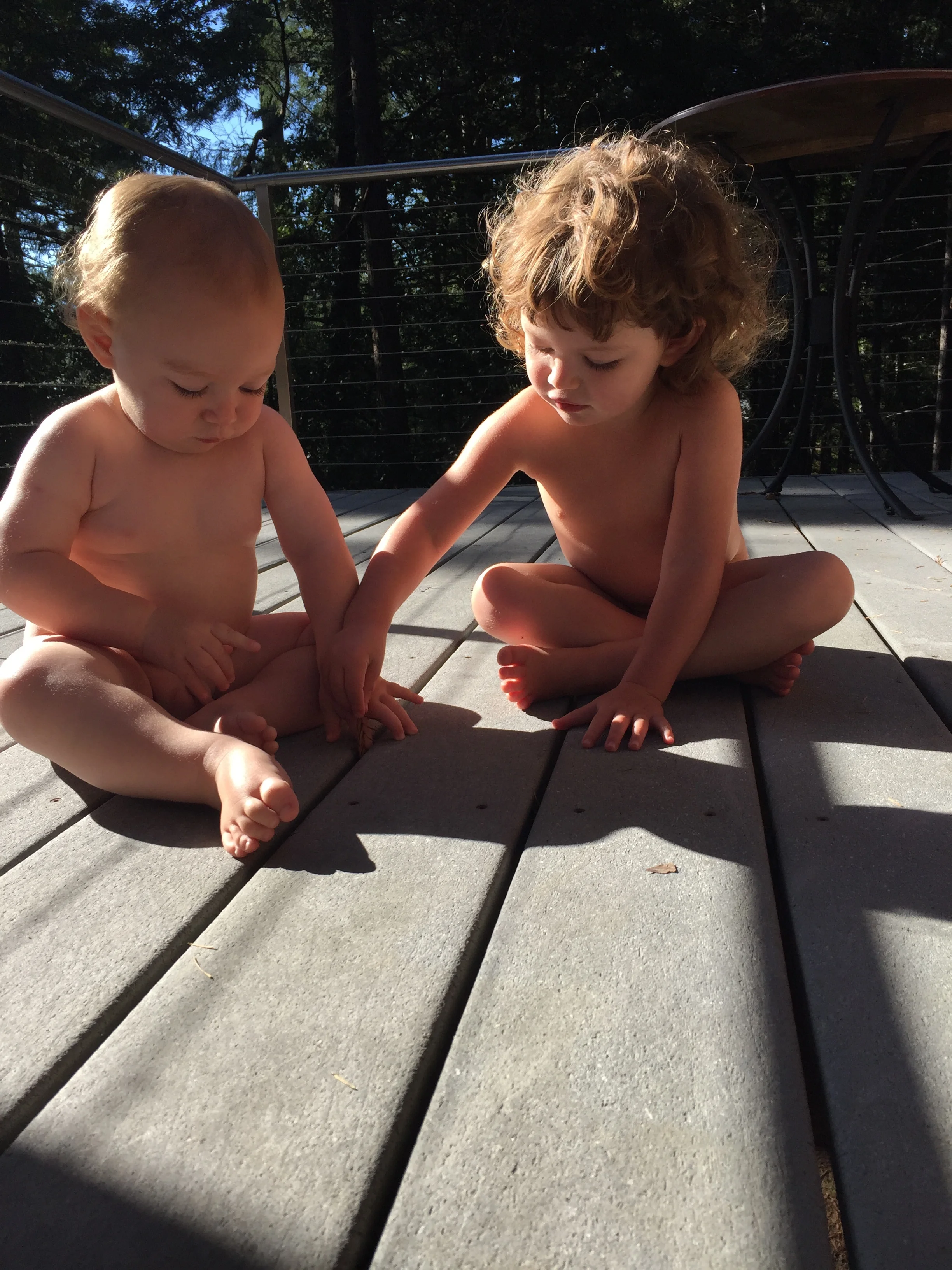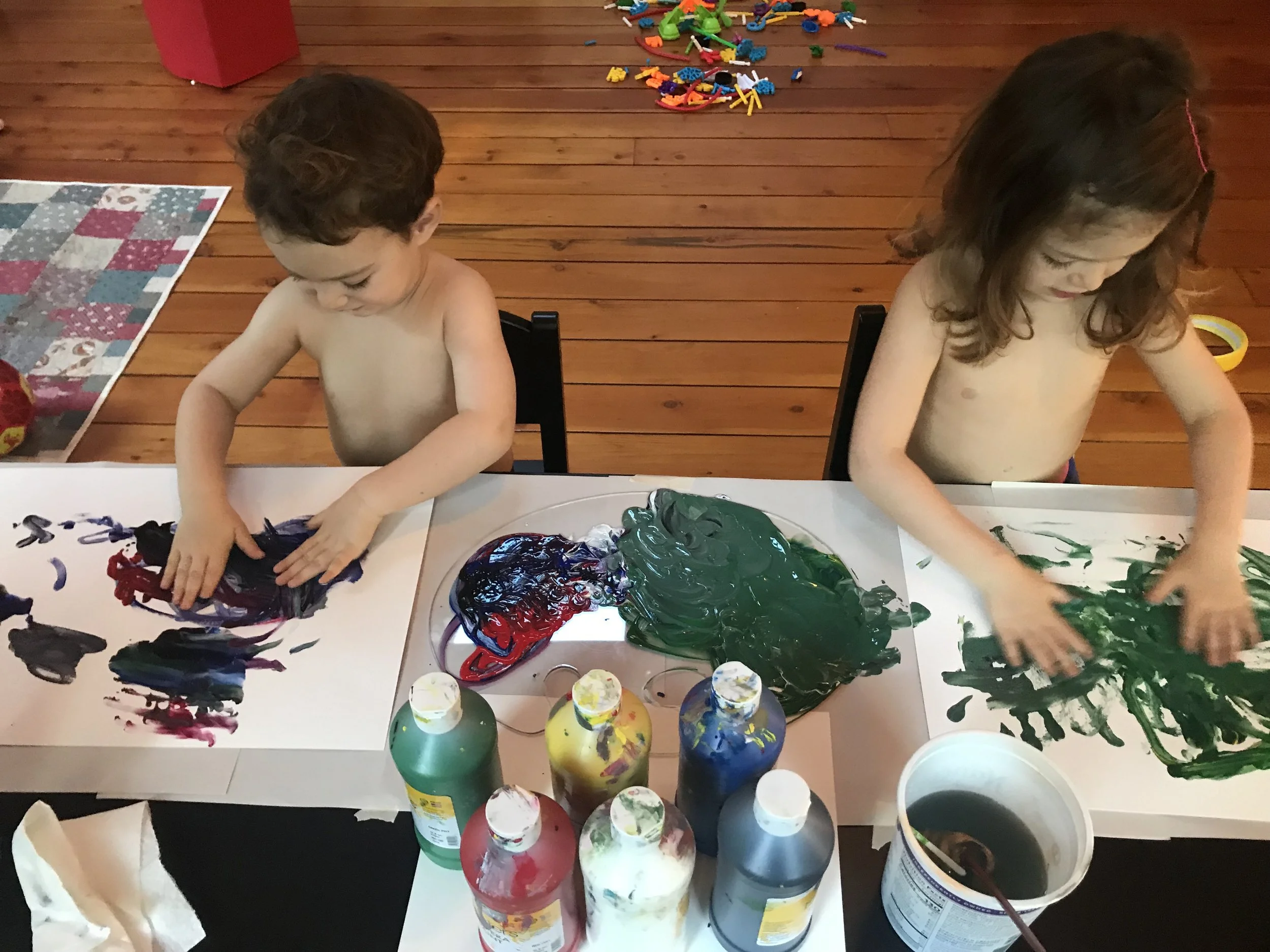I get asked a lot if my children are in pre school, and when they will be going to school. It comes about in two ways. Because we are nomadic people rapidly ask about school, as in, 'you know you will need to settle down soon and send your children to school.' Or I get asked what I do, and when I reply that most of the time I am a mother, people think 'oh she is just a mom,' and then ask me why my children are not in pre school. Which ever direction it comes from I end up reflecting on why I do not send my children to kindergarten now, and also what I might do in the future.
At first my decision not to send my children to kindergarten was because I wanted to give them all of me for their first six years. I felt this time was so precious, and if we had the resources I wanted to share that time with them. Nomadism meant pre school was not really an option - unless we did small amounts here and there. As time went on I got interested in education and started researching. I began following a Montessori curriculum and reading Montessori material. Home schooling made sense and the stats show it works brilliantly. Then I got into Waldorf education, and then started reading about the neuroscience of children's brains and learning development. The more I read the less I bought into the idea that little children should be in school. All of this remains strong in the answer as to why I do what I do. But the following is the extended version of that answer for me now.
Relationship
The most common reason people give me for why I should send them to school is because little people need to socialize with other little people. They say my children need this and will get bored and be unsocialised without it. Whilst I think children want to and need friends I am sceptical if pre school is necessary for that. Most little ones are not interested in being friends the way we think of it. Not until six or seven years old. Friendship is more fleeting and in the beginning more a checking out process and comparative analysis of what you got and I don't. Friendship is also not something that should be limited to a certain age group. The idea of putting lots of children who are the same or close to the same age together in a room, for most of the day, is very a very recent phenomenon. And it emerged more from war time necessity and the industrial revolution when the usual nurturers went to work. Adults need time away from their children and somewhere to put them. That is good and fine, but best if this reason for pre school is upfront. The excuse of needed socialization is bullshit.
What children do need, primarily, is relationship. Specifically they need connection that lets them meander in conversation, a way of relating that is curious about what they think and feel, and care that wants to help without getting in the way of their own solution. This kind of relationship is easily found in a mother, father, grandmother, aunt and so on. Family is the first bond and was originally much extended with all of those hands reaching out to care for little ones. I bring my children into family space as much as I can, spending months in each part of the world where our family lives. Relationship of the sibling variety has been deeply nurtured by not doing school. I watch as my children grow up together, sharing their days. They are close. They love and war, and the intimacy is palpably solid. Beyond us, our family and blood lines, I nurture their relationships with close friends, godmothers and godfathers, and the people we meet in our journeys.
Ruya now goes onto a playground and if she feels like it and someone interests her, she says she wants to make friends and goes off and does just that. I watch as she runs around with the girl who has a fairy dress on, holding hands and being friends, and then they say goodbye and it's done. For now that is all she needs. That will change. When it does the question of her going to school will be more of her choosing, and it still won't mean friends will only be found there. I hope to explore with her the idea of friendship as something that never has and never will rest upon being in any institution.
Academics
Pre school has increasingly become the hub of preparation for school. It has got academic and pressured. The blocks and free time are diminishing, the alphabet and apparently necessary mathematical skills are increasing. Not everywhere of course. Waldorf type preschools are not structured that way and neither are many preschools in places like Scandinavia or Germany. The research is showing that this early academic preparation doesn't increase later success, and may actually work against it. In Finland for instance academic teaching does not start until children are in their first year of school, around seven years old. And they still surpass the USA in academic achievement. There is plenty of evidence that academics so young is not useful or necessary. But more insidiously in pushing academic preparatory learning adults are marginalizing the stuff that children want to do. We are making children use their time, which is as precious as ours, doing stuff they don't get to choose and may not need. And we are doing it righteously without any remorse. I wish little people's power was more celebrated. Then we might see their protests and stop calling it ADHD, being badly behaved and tantruming. We might see their protest as a right to choose some of what they do with their time, and trust it is actually what they need to be doing.
For a while I have felt a great need to academically prepare my children. That my value as a mother who cares for her children full time, will be measured by how academically impressive they are as young as possible. Over time this has eroded, though it still catches me. I have come to realise that academic preparation is a straw man. Its hollow and doesn't really say much. Their academic success is going to be determined by their emotional capacity to regulate themselves - be patient, see what another person might be feeling, keep trying when they fall. But more importantly their success in life will be determined less by academic merit and much more by their capacity to be creative and connected. Academics are important, but it's secondary and rests on other meta stuff. Creativity emerges from imagination and that requires an environment that is open ended and a respect for what children might know that we don't.
Play
What little ones mostly want to do is play. And that play is exactly what they should do, with less toys and more stuff that lets creativity roam. Stuff like buttons and cups, pebbles and sand, boxes and puzzles, dolls and tents, pots and books. Much of the day my children have to do stuff that I need to do, like cleaning, cooking, shopping, laundry and waiting. And that stuff is as important, if not more so at this age, than abc's. So we make this play too, which is good for me and them. Play is work, children's work and should be respected as much as adults respect the work they do. Maybe even more, because their play is going to generate the innovation our society needs to adapt, create and sustain into the future. But play is also beyond work. Defining play is much like defining love, incredibly difficult. But the best descriptions always include an idea of self directed choice which is emotionally meaningful to the child, mixed in with a big dose of imagination. This means play most easily happens outside of a didactic and overly structured instruction. In fact it will happen best when the child is the one directing and the teachers are facilitating. Facilitation is much harder than directing, it requires noticing what someone else intends and supporting that to flourish.
The biggest gain I see from keeping my children out of school right now is that they get to play more. Of course this excludes the school environments that truly support children's play, and they are increasingly rare. But the problem with most people seeing this value is that play has been so eradicated from children's lives that when children are given free time they don't know what to do with it, they don't know how to play. Play is instinctual and our children are wired for it, but it has to be nurtured. In fact the best nurturing neuropsychologist recommend is that of guided play. This is a fancy phrase for what we have really been doing for thousands of years. Supporting children to play within an environment of stuff that guides their imagination, and in conversation with us. Conversations where their imagination mixes with our realism and creates new worlds, literally.
I hope that if and when my children go to school it is because they want to and find nourishment there to blossom. I think there are amazing schools in the world and I would love to experience being part of one. Those choices will come later. For now I am deeply grateful to be able to let them run wild. So now when I get asked about why I don't send my children to pre school I just say because I don't have to, and wait to see if anymore answer is required.




